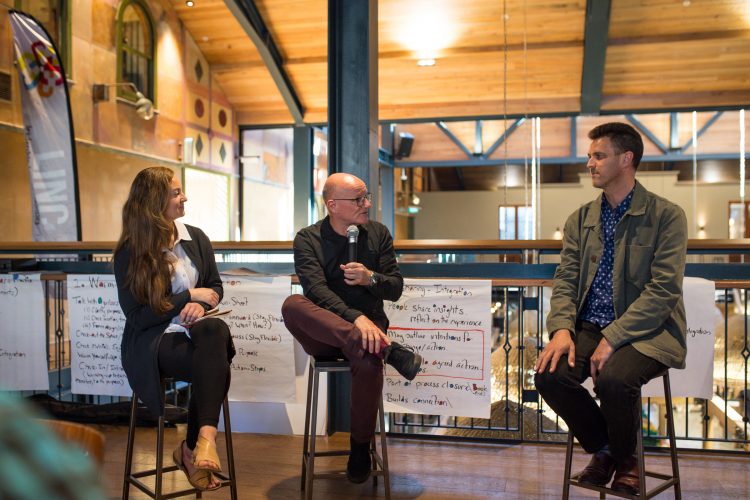
August 1st, 2020
Living and leading in a time of change: Four Foundations
Earlier this year I wrote a post noting that the global Covid-19 death toll had passed 40,000. At the time I had hoped that the crisis might be over within a few months. This has not been the case and the death toll is currently approaching 700,000. The Covid-19 crisis is the most obvious example of disruptive changes that are driving fundamental (and often painful) shifts in the global community. Years ago, Vaclav Havel gave a speech that captures the essence of the current period of change.
Today, many things indicate that we are going through a transitional period, when it seems that something is on the way out and something else is painfully being born. It is as if something were crumbling, decaying, and exhausting itself, while something else, still indistinct, were arising from the rubble…Something is happening, something is being born…We are in a phase when one age is succeeding another [and] everything is possible.
Leadership Lab’s purpose is to help leaders to flourish in the face of change and complexity. This requires a mindset that is focused, in Havel’s terms, on the unprecedented possibilities of what is “being born” rather than what is “crumbling and decaying”. For many of us there are days when this can be a challenge. As I’ve reflected on this challenge four life foundations seem to be supportive of our success as leaders in an uncertain world.
1
As much as possible maintain core routines around sleep, exercise, diet, mindfulness, personal organisation, spiritual practice and self-care. These routines can offer a safe harbour of normality when everything else may be in flux.
2
Practice whakawhanaungatanga and create positive relationships with family, friends, work colleagues and the people we meet day to day. Jim Collins, in a recent seminar, suggested that investing in our relationships may be the best provision we can make for an uncertain future. There is a wealth of research data to support his view. When times are tough prioritise relationships, “be strong and be kind”.
3
Build our capacity for appreciative inquiry and conscious optimism. Cultivate a quality of attention that allows us to look to the light and life of the systems we are in and move towards the incredible possibilities of the future rather than surrender to cynicism and despair.
4
In the midst of change and uncertainty remember that we have resources within us that are very deep and very stable. “We need constant reminding” writes Michael McCarthy, “that we have been operators of computers for a single generation and workers in neon-lit offices for three or four, but we were farmers for five hundred generations, and before that hunter-gatherers for perhaps fifty thousand or more”. This inheritance, he suggests, gives us capacities and “feelings” that are “surely, very old” and that can provide a kind of archetypal guidance that can help us transcend the vicissitudes of change and complexity. Perhaps the best response to these times of uncertainty may be to use that interior wisdom to strip away the clutter of our lives, sacrifice those things that detract from living in full alignment with our values and come home to our true selves. If we must travel through constant challenge and change, let’s travel light, re-prioritise the things that really, really, matter and anchor them at the centre of our life experience and leadership.
– Peter Cammock, Co-Director Leadership Lab

August 1st, 2020
Living and leading in a time of change: Four Foundations
Earlier this year I wrote a post noting that the global Covid-19 death toll had passed 40,000. At the time I had hoped that the crisis might be over within a few months. This has not been the case and the death toll is currently approaching 700,000. The Covid-19 crisis is the most obvious example of disruptive changes that are driving fundamental (and often painful) shifts in the global community. Years ago, Vaclav Havel gave a speech that captures the essence of the current period of change.
Today, many things indicate that we are going through a transitional period, when it seems that something is on the way out and something else is painfully being born. It is as if something were crumbling, decaying, and exhausting itself, while something else, still indistinct, were arising from the rubble…Something is happening, something is being born…We are in a phase when one age is succeeding another [and] everything is possible.
Leadership Lab’s purpose is to help leaders to flourish in the face of change and complexity. This requires a mindset that is focused, in Havel’s terms, on the unprecedented possibilities of what is “being born” rather than what is “crumbling and decaying”. For many of us there are days when this can be a challenge. As I’ve reflected on this challenge four life foundations seem to be supportive of our success as leaders in an uncertain world.
1
As much as possible maintain core routines around sleep, exercise, diet, mindfulness, personal organisation, spiritual practice and self-care. These routines can offer a safe harbour of normality when everything else may be in flux.
2
Practice whakawhanaungatanga and create positive relationships with family, friends, work colleagues and the people we meet day to day. Jim Collins, in a recent seminar, suggested that investing in our relationships may be the best provision we can make for an uncertain future. There is a wealth of research data to support his view. When times are tough prioritise relationships, “be strong and be kind”.
3
Build our capacity for appreciative inquiry and conscious optimism. Cultivate a quality of attention that allows us to look to the light and life of the systems we are in and move towards the incredible possibilities of the future rather than surrender to cynicism and despair.
4
In the midst of change and uncertainty remember that we have resources within us that are very deep and very stable. “We need constant reminding” writes Michael McCarthy, “that we have been operators of computers for a single generation and workers in neon-lit offices for three or four, but we were farmers for five hundred generations, and before that hunter-gatherers for perhaps fifty thousand or more”. This inheritance, he suggests, gives us capacities and “feelings” that are “surely, very old” and that can provide a kind of archetypal guidance that can help us transcend the vicissitudes of change and complexity. Perhaps the best response to these times of uncertainty may be to use that interior wisdom to strip away the clutter of our lives, sacrifice those things that detract from living in full alignment with our values and come home to our true selves. If we must travel through constant challenge and change, let’s travel light, re-prioritise the things that really, really, matter and anchor them at the centre of our life experience and leadership.
– Peter Cammock, Co-Director Leadership Lab


